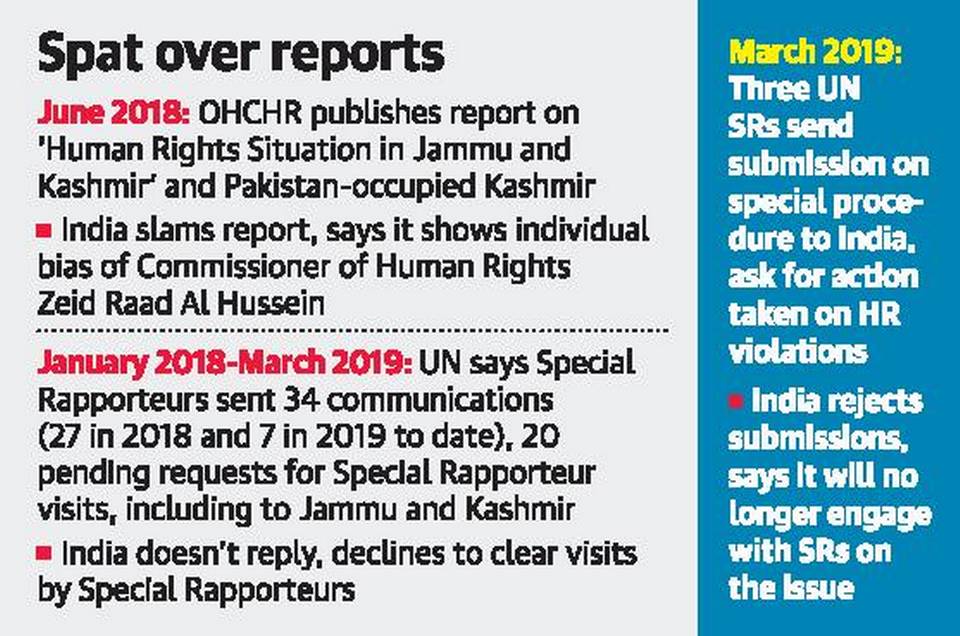United Nation Human Rights Council (UNHRC) 21/05/2019 – Posted in: Daily News – Tags: OHCHR, UNHRC
UNITED NATION HUMAN RIGHTS COUNCIL (HRC)
For: Mains
Topic covers: India’s strong response to UNHRC Special Rapporteurs, OHCHR
News Flash
Responding irately to a submission from the Geneva-based Human Rights Council (HRC) on alleged violation in Jammu and Kashmir, India has informed the United Nations body that it will never again engage any communication with the HRC’s Special Rapporteurs on its report.
The report from the UN body came at the same time as a report from two NGOs in Jammu and Kashmir on alleged cases of torture, was released in Srinagar, which was endorsed by a former UN Special Rapporteur.
| Special Rapporteur: A person who is appointed by an organization to report on the proceedings of its meetings. |
Queries on action taken
The current Special Rapporteurs on Extrajudicial Executions, Torture, and Right to Health had referred to a previous June 2018 report of the Office of the High Commissioner of Human Rights (OHCHR) and written to the government in March 2019, asking about steps taken by New Delhi to address alleged human rights violations listed in the report.
The Special Rapporteurs had listed “13 cases of concern” from the year 2018 alone in which “four children were among eight civilians killed by members of the security forces.”
India’s Action
India rejected all the claims.
Indian Permanent Mission to the United Nations in Geneva replied to the OHCHR saying that India does not intend to engage further with these mandate holders on the issue,” whom it accused of “individual prejudice”.
Biasness observed
India had also rejected the OHCHR’s report on the “Situation of Human Rights in Kashmir” — the first ever such report on J&K that came out in June 2018 — and accused the High Commissioner of Human Rights Zeid Ra’ad Al Hussein of “clear bias” in bringing it out.
OHCHR
- The Office of the High Commissioner for Human Rights (UN Human Rights) is the leading UN entity on human rights.
- The General Assembly entrusted both the High Commissioner and her Office with a unique mandate to promote and protect all human rights for all people.
- The United Nations human rights programme aims to ensure that the protection and enjoyment of human rights is a reality in the lives of all people.
- UN Human Rights also plays a crucial role in safeguarding the integrity of the three interconnected pillars of the United Nations – peace and security, human rights and development.
Its Structure
- UN Human Rights is part of the United Nations Secretariat.
- Its headquarter is in Geneva, as well as an office in New York.
- UN Human Rights supports the human rights components of UN peace missions or political offices and deploys human rights advisers to work with the United Nations Country teams.
The Geneva-based headquarters has three substantive divisions
- Thematic Engagement, Special Procedures and Right to Development Division (TESPRDD), which develops policy and provides guidance, tools, advice and capacity-strengthening support on thematic human rights issues, including for human rights mainstreaming purposes; and provides support to the Human Rights Council’s special procedures.
- Human Rights Council and Treaty Mechanisms Division (CTMD), which provides substantive and technical support to the HRC and the Council’s UPR mechanism, and supports the human rights treaty bodies.
- Field Operations and Technical Cooperation Division (FOTCD), which is responsible for overseeing and implementing the Office’s work in the field.
UN Human Rights Council (UNHRC)
- It is a United Nations body whose mission is to promote and protect human rights around the world.
- The UNHRC has 47 members elected for staggered three-year terms on a regional group basis.
- The 38th session of the UNHRC began June 18, 2018. It ended on July 7, 2018.
- The headquarters of UNHRC is in Geneva, Switzerland.
The UNHRC investigates allegations of breaches of human rights in UN member states, and addresses important thematic human rights issues such as freedom of association and assembly, freedom of expression, freedom of belief and religion, women’s rights, LGBT rights, and the rights of racial and ethnic minorities.
The UNHRC was established by the UN General Assembly on March 15, 2006 to replace the UN Commission on Human Rights that had been strongly criticised for allowing countries with poor human rights records to be members.
Source: The Hindu
You can follow us on LinkedIn and for more updates related to UPSC IAS Preparation, Like our Facebook Page and subscribe our Diligent IAS Youtube Channel
Also Read Related Daily News
- Redefined Units of Kilogram, Kelvin, Mole and Ampere across the World
- Comprehensive Test Ban Treaty Organization
- Services Trade Restrictiveness Index (STRI)


